Title: Army Private, Civil War; 1st Lieutenant, National Guard; police officer, brewer
Birthdate: March 2, 1839
Death Date: August 2, 1901
Plot Location: Section 6, Lot 66
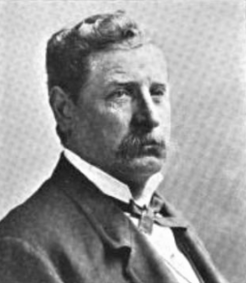
John was born Johannes Walde, a German immigrant who anglicized his name after he arrived in America on May 26, 1857. Records of his military service are scant, but one record showed he enlisted in the Army on May 1, 1858, serving a five-year term. His listed age was 22 although he was actually 19 and his rank was bugler in a rifle company, but where he served and with what regiment is unclear. After the war he was an active member of the Grand Army of the Republic (GAR), the popular and increasingly powerful Civil War veterans’ organization.
John’s first marriage was to a woman named Eliza and their first son was named after his father when he was born in 1866. Three other sons and a daughter would also join the family. John served the city of Philadelphia as a police officer for a brief time. Perhaps because of his German background, however, his passion was beer. His city directory listings from 1867 through the 1870s list his occupation simply as “lager.”
However, John didn’t totally abandon his military service. He joined the Pennsylvania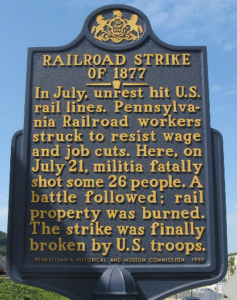 National Guard as a sergeant in March of 1875 and was promoted to 1st Lieutenant in 1877. That summer his leadership skills were put to the test when railroad workers in several states went on strike. The worst violence broke out in Pittsburgh when the governor had to call up the troops. John was one of 600 that arrived from Philadelphia to bring order, as described by this historical marker at 28th and Liberty Avenue in the Burgh. His service with the Guard was over in November of 1881. It appears that Eliza died sometime after that, so he married a Swiss woman named Anna. Documents are not in agreement over her maiden name although it is Beglinger on her gravestone.
National Guard as a sergeant in March of 1875 and was promoted to 1st Lieutenant in 1877. That summer his leadership skills were put to the test when railroad workers in several states went on strike. The worst violence broke out in Pittsburgh when the governor had to call up the troops. John was one of 600 that arrived from Philadelphia to bring order, as described by this historical marker at 28th and Liberty Avenue in the Burgh. His service with the Guard was over in November of 1881. It appears that Eliza died sometime after that, so he married a Swiss woman named Anna. Documents are not in agreement over her maiden name although it is Beglinger on her gravestone.
Meanwhile John had what one city directory showed as a saloon business, and at some point he realized he was doing so well in buying and selling beer he might vertically  integrate his business by making the beer as well. He set up a brewery in 1884 on the corner of Broad and Christian Streets. A year later, he formed a partnership with John Thomas, a Philadelphia native, who had been a partner in another brewery. Together they created the Welde and Thomas Brewing Company.
integrate his business by making the beer as well. He set up a brewery in 1884 on the corner of Broad and Christian Streets. A year later, he formed a partnership with John Thomas, a Philadelphia native, who had been a partner in another brewery. Together they created the Welde and Thomas Brewing Company.
As the business prospered it was relocated and modernized with innovative equipment, growing the brewing capacity of the plant to 50,000 barrels per year. In March 1897, Welde and Thomas merged with five other breweries to form the Consumer’s Brewing Company. The combined breweries were able to produce approximately 300,000 barrels a year.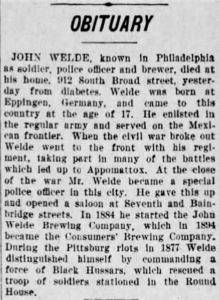
The year before the merger Anna died and John took Margurite Fiss to be his third wife in 1897. The 1900 census shows John’s son Joseph living with them along with his wife and infant daughter. But the domestic order changed the following year when John died of diabetes and was buried here with Anna.
Just two weeks prior he signed an extensive will leaving sums of money for his wife, children, and grandchildren from his estate, which was appraised at $48,000. He also requested that some cash and beer be donated to three veterans’ organizations, and $100 be used for refreshments at his funeral (probably in the form of beer although not specifically stated).
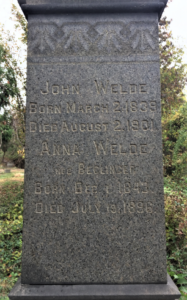 Perhaps that sum of money for drinks wasn’t enough, considering the size of the crowd. A newspaper account said 200 carriages were lined up for the processional. The graveside service was conducted by the Masons and members of the GAR.
Perhaps that sum of money for drinks wasn’t enough, considering the size of the crowd. A newspaper account said 200 carriages were lined up for the processional. The graveside service was conducted by the Masons and members of the GAR.
As a side note, brewing held an important place in Pennsylvania and Philadelphia history. The first brewery in the City was erected in 1683. William Penn constructed a brew house on his estate in Bucks County. In the 1700s the drink of choice in most taverns was beer or ale, and by 1793 Philadelphia was producing more beer than all the other seaports in the country. At one point there were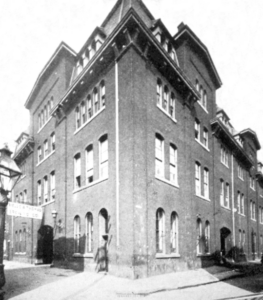 455 breweries in the city.
455 breweries in the city.
The Welde and Thomas Brewing Company occupied this building in 1887 at Fitzwater and Juniper Streets, but Consumers Brewing had to shut it down in 1920 during Prohibition. Trainer Brewing Company operated here from 1933-37, followed by Otto Erlanger Brewing until 1951. The building has since been demolished.
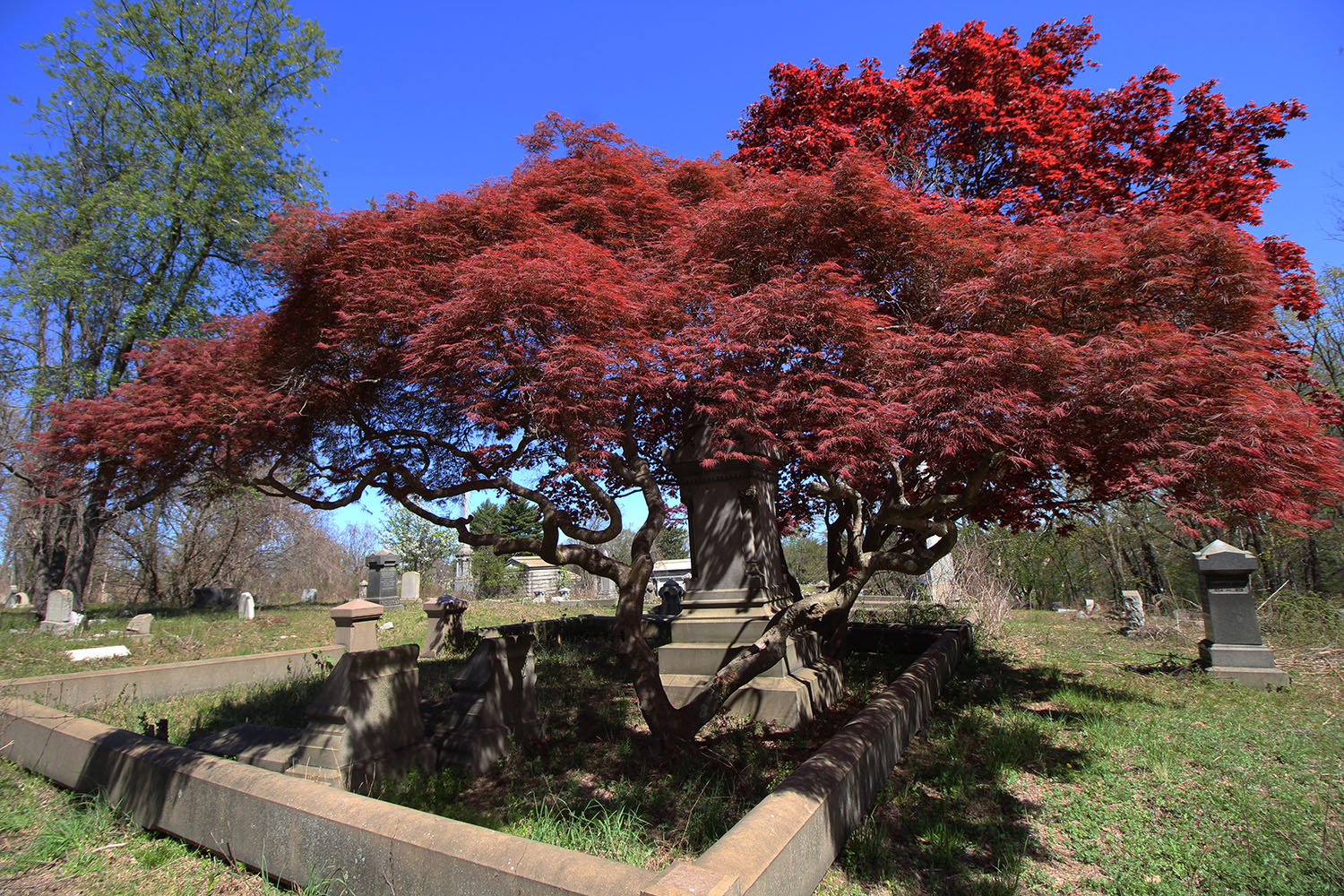
Support the Friends of Mount Moriah
Help us in our mission to restore and maintain the beautiful Mount Moriah Cemetery by donating to our cause or volunteering at one of our clean-up events.

